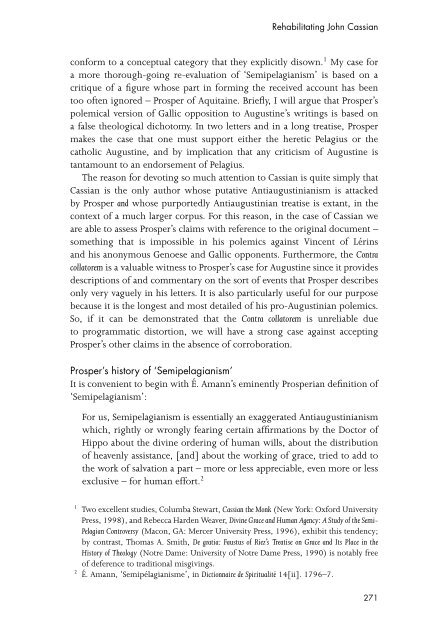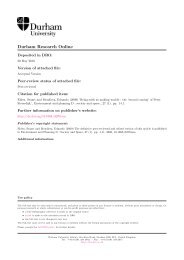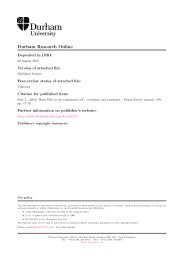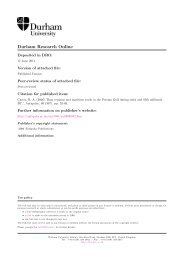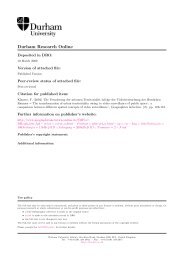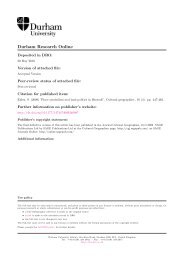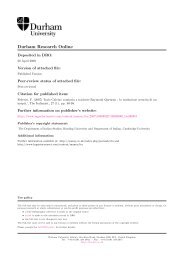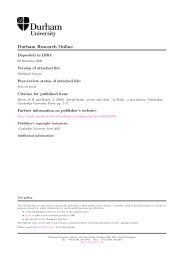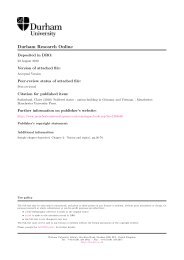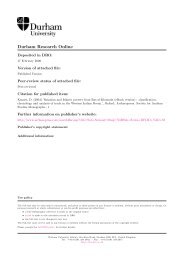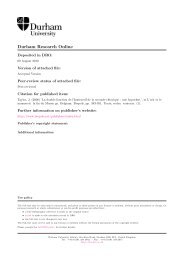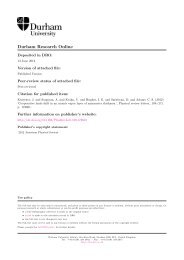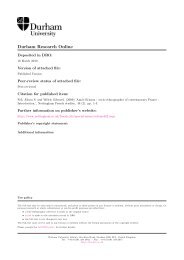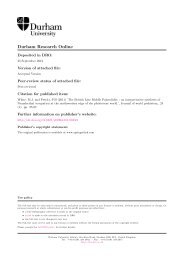Rehabilitating John Cassian: an evaluation of Prosper of Aquitaine's ...
Rehabilitating John Cassian: an evaluation of Prosper of Aquitaine's ...
Rehabilitating John Cassian: an evaluation of Prosper of Aquitaine's ...
You also want an ePaper? Increase the reach of your titles
YUMPU automatically turns print PDFs into web optimized ePapers that Google loves.
<strong>Rehabilitating</strong> <strong>John</strong> <strong>Cassi<strong>an</strong></strong><br />
conform to a conceptual category that they explicitly disown. 1 My case for<br />
a more thorough-going re-<strong>evaluation</strong> <strong>of</strong> ‘Semipelagi<strong>an</strong>ism’ is based on a<br />
critique <strong>of</strong> a figure whose part in forming the received account has been<br />
too <strong>of</strong>ten ignored – <strong>Prosper</strong> <strong>of</strong> Aquitaine. Briefly, I will argue that <strong>Prosper</strong>’s<br />
polemical version <strong>of</strong> Gallic opposition to Augustine’s writings is based on<br />
a false theological dichotomy. In two letters <strong>an</strong>d in a long treatise, <strong>Prosper</strong><br />
makes the case that one must support either the heretic Pelagius or the<br />
catholic Augustine, <strong>an</strong>d by implication that <strong>an</strong>y criticism <strong>of</strong> Augustine is<br />
t<strong>an</strong>tamount to <strong>an</strong> endorsement <strong>of</strong> Pelagius.<br />
The reason for devoting so much attention to <strong>Cassi<strong>an</strong></strong> is quite simply that<br />
<strong>Cassi<strong>an</strong></strong> is the only author whose putative Antiaugustini<strong>an</strong>ism is attacked<br />
by <strong>Prosper</strong> <strong>an</strong>d whose purportedly Antiaugustini<strong>an</strong> treatise is ext<strong>an</strong>t, in the<br />
context <strong>of</strong> a much larger corpus. For this reason, in the case <strong>of</strong> <strong>Cassi<strong>an</strong></strong> we<br />
are able to assess <strong>Prosper</strong>’s claims with reference to the original document –<br />
something that is impossible in his polemics against Vincent <strong>of</strong> Lérins<br />
<strong>an</strong>d his <strong>an</strong>onymous Genoese <strong>an</strong>d Gallic opponents. Furthermore, the Contra<br />
collatorem is a valuable witness to <strong>Prosper</strong>’s case for Augustine since it provides<br />
descriptions <strong>of</strong> <strong>an</strong>d commentary on the sort <strong>of</strong> events that <strong>Prosper</strong> describes<br />
only very vaguely in his letters. It is also particularly useful for our purpose<br />
because it is the longest <strong>an</strong>d most detailed <strong>of</strong> his pro-Augustini<strong>an</strong> polemics.<br />
So, if it c<strong>an</strong> be demonstrated that the Contra collatorem is unreliable due<br />
to programmatic distortion, we will have a strong case against accepting<br />
<strong>Prosper</strong>’s other claims in the absence <strong>of</strong> corroboration.<br />
<strong>Prosper</strong>’s history <strong>of</strong> ‘Semipelagi<strong>an</strong>ism’<br />
It is convenient to begin with É. Am<strong>an</strong>n’s eminently <strong>Prosper</strong>i<strong>an</strong> definition <strong>of</strong><br />
‘Semipelagi<strong>an</strong>ism’:<br />
For us, Semipelagi<strong>an</strong>ism is essentially <strong>an</strong> exaggerated Antiaugustini<strong>an</strong>ism<br />
which, rightly or wrongly fearing certain affirmations by the Doctor <strong>of</strong><br />
Hippo about the divine ordering <strong>of</strong> hum<strong>an</strong> wills, about the distribution<br />
<strong>of</strong> heavenly assist<strong>an</strong>ce, [<strong>an</strong>d] about the working <strong>of</strong> grace, tried to add to<br />
the work <strong>of</strong> salvation a part – more or less appreciable, even more or less<br />
exclusive – for hum<strong>an</strong> effort. 2<br />
1 Two excellent studies, Columba Stewart, <strong>Cassi<strong>an</strong></strong> the Monk (New York: Oxford University<br />
Press, 1998), <strong>an</strong>d Rebecca Harden Weaver, Divine Grace <strong>an</strong>d Hum<strong>an</strong> Agency: A Study <strong>of</strong> the Semi-<br />
Pelagi<strong>an</strong> Controversy (Macon, GA: Mercer University Press, 1996), exhibit this tendency;<br />
by contrast, Thomas A. Smith, De gratia: Faustus <strong>of</strong> Riez’s Treatise on Grace <strong>an</strong>d Its Place in the<br />
History <strong>of</strong> Theology (Notre Dame: University <strong>of</strong> Notre Dame Press, 1990) is notably free<br />
<strong>of</strong> deference to traditional misgivings.<br />
2 É. Am<strong>an</strong>n, ‘Semipélagi<strong>an</strong>isme’, in Dictionnaire de Spiritualité 14[ii]. 1796–7.<br />
271


